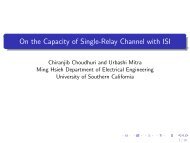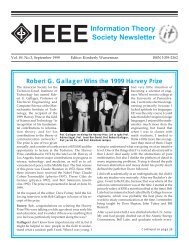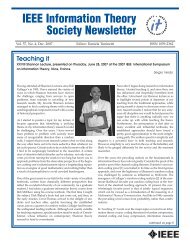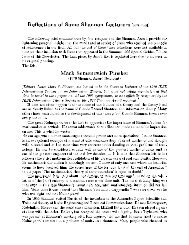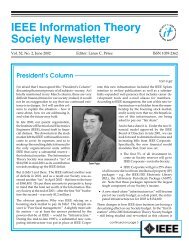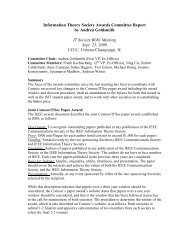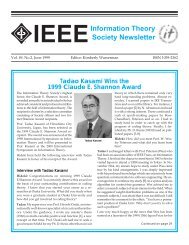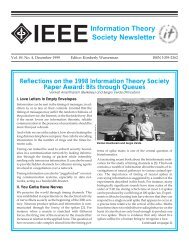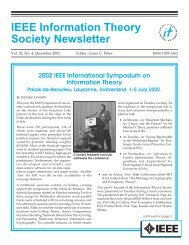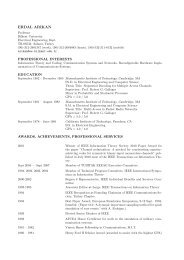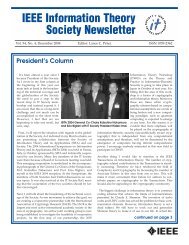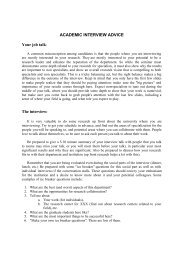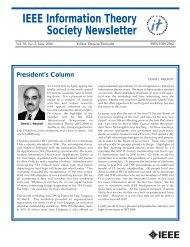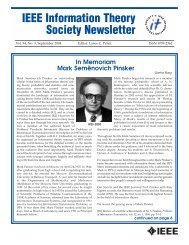September 2002 - Information Theory Society - the IEEE Information ...
September 2002 - Information Theory Society - the IEEE Information ...
September 2002 - Information Theory Society - the IEEE Information ...
You also want an ePaper? Increase the reach of your titles
YUMPU automatically turns print PDFs into web optimized ePapers that Google loves.
7<br />
less-frequent scheduling, <strong>the</strong>re was a consensus that rigidly<br />
holding <strong>the</strong> meeting in late June/early July every year is not a<br />
good idea. For too many potentially attractive venues – e.g.,<br />
<strong>the</strong> American south, Australia, etc. – late June/early July is<br />
simply not a good time to schedule a meeting. (As an alternative,<br />
some members of <strong>the</strong> Board mentioned <strong>the</strong> model of <strong>the</strong><br />
International Conference on Communications, or ICC – a<br />
yearly conference that typically convenes sometime in a<br />
three-month window from April to June.) In addition, <strong>the</strong>re<br />
was agreement that we should avoid if possible having a submission<br />
deadline for <strong>the</strong> next ISIT only 3-4 months after <strong>the</strong><br />
close of <strong>the</strong> previous ISIT; with electronic submissions and<br />
o<strong>the</strong>r efficiency-enhancing practices, we should be able to<br />
have <strong>the</strong> submission deadline “only” 6-7 months prior to <strong>the</strong><br />
start of <strong>the</strong> Symposium, which (in most years, depending on<br />
<strong>the</strong> scheduling of <strong>the</strong> symposia) would give our community a<br />
little “breathing room” between deadlines.<br />
So, given <strong>the</strong>re was no consensus, we did what boards do<br />
best – we set up an ad hoc committee to study <strong>the</strong> issue. The<br />
charge of <strong>the</strong> committee was to formulate a couple of “candidate”<br />
proposals taking into account <strong>the</strong> issues that <strong>the</strong> board<br />
did agree on. This issue will be revisited at <strong>the</strong> October <strong>2002</strong><br />
Board meeting.<br />
One final note: While <strong>the</strong>re was no formal vote on this issue, a<br />
“straw vote” among Board members indicated most leaning<br />
towards a yearly symposium, assuming some flexibility could<br />
be built into <strong>the</strong> actual scheduling. In contrast, <strong>the</strong> (admittedly<br />
unscientific) paper poll taken among ISIT attendees showed<br />
most of those responding preferring <strong>the</strong><br />
two-ISITs-every-three-years format. If you have an opinion on<br />
this issue, I would invite you to send it to me at tfuja@nd.edu.<br />
IT – The Next Generation<br />
I guess it is my deep-and-undeniable passage into middle<br />
age that made me so aware of <strong>the</strong> many young researchers at<br />
<strong>the</strong> Lausanne ISIT. Of <strong>the</strong> 729 attendees, 234 (32%) were students,<br />
and many more were recent graduates and new assistant<br />
professors. Certainly it is indicative of <strong>the</strong> life and<br />
vibrancy of information <strong>the</strong>ory as a technical discipline that<br />
so many young researchers are choosing to spend <strong>the</strong>ir time<br />
and effort working on our problems.<br />
I also thought it was great that – for <strong>the</strong> second year in a row –<br />
<strong>the</strong> <strong>IEEE</strong> Graduate Teaching Award was presented to a<br />
member of our community at an ISIT. This is an <strong>IEEE</strong>-wide<br />
Technical Field Award for “inspirational teaching of graduate<br />
students.” The 2001 award was given to Princeton’s<br />
Vince Poor at <strong>the</strong> Washington ISIT, while in Lausanne <strong>the</strong><br />
<strong>2002</strong> award went to Vijay Bhargava of <strong>the</strong> University of Victoria.<br />
Both are longstanding members of our community,<br />
having published much of what is on <strong>the</strong>ir vitae in our Transactions<br />
and having served <strong>the</strong> IT <strong>Society</strong> in many capacities,<br />
including president – Poor in 1990 and Bhargava in 2000.<br />
Both Vince and Vijay were modest about <strong>the</strong>ir selection for<br />
<strong>the</strong> Graduate Teaching Award. In <strong>the</strong> resulting Newsletter<br />
article, Vince talked about <strong>the</strong> importance of giving graduate<br />
students independence: “My experience has been that<br />
students are more productive in <strong>the</strong> long run if given enough<br />
time and freedom to find <strong>the</strong>ir own way through research issues.”<br />
Vince also indicated his belief that graduate teaching<br />
“… is not so much one of imparting knowledge to ano<strong>the</strong>r<br />
person as it is one of learning alongside ano<strong>the</strong>r person.”<br />
Characteristically, Vijay was a little more vibrant in his take<br />
on <strong>the</strong> honor: “I received this award for drinking beer with<br />
my graduate students,” he claimed. “And I shall spend <strong>the</strong><br />
honorarium <strong>the</strong> same way.”<br />
Their reactions reminded me of <strong>the</strong> time when I was a<br />
brand-new assistant professor and hosted a<br />
much-accomplished IT researcher as he visited <strong>the</strong> University<br />
of Maryland, where I worked at <strong>the</strong> time. I confessed to<br />
<strong>the</strong> visiting luminary that, while I was reasonably confident<br />
about my abilities in most of <strong>the</strong> areas required of faculty<br />
members, I wasn’t at all sure about my ability to supervise<br />
grad students. His reaction was blunt: “For a lot of students,<br />
it almost doesn’t matter what you do,” he told me. “Good<br />
students will accomplish a lot no matter how bad you are as<br />
an advisor, and poor students won’t do much no matter how<br />
much you help <strong>the</strong>m.”<br />
Vince and Vijay similarly downplay <strong>the</strong> significance of <strong>the</strong>ir<br />
own roles in training and “mentoring” <strong>the</strong> next generation of<br />
information <strong>the</strong>orists. But we as a <strong>Society</strong> have benefited tremendously<br />
from <strong>the</strong>ir efforts and similar efforts by hundreds<br />
of professors and research supervisors over <strong>the</strong> last fifty years.<br />
The youthful enthusiasm of <strong>the</strong> <strong>Information</strong> <strong>Theory</strong> <strong>Society</strong>,<br />
on display in Lausanne, bodes well for <strong>the</strong> next fifty years.<br />
And Finally, a Word About Finances<br />
I have received a lot of feedback about my “President’s Column”<br />
describing <strong>the</strong> <strong>Society</strong>’s uncertain financial status in <strong>the</strong> June<br />
Newsletter. Thank you to all who spoke to me in Lausanne or<br />
wrote e-mails with your suggestions and opinions.<br />
The situation is marginally better than what I described in<br />
June, but still alarming. <strong>IEEE</strong> Corporate has made some cost<br />
reductions that have reduced somewhat <strong>the</strong> “infrastructure<br />
charge” to each society. However, <strong>the</strong> 26% “tax” on our intellectual<br />
property income – our main source of income – remains,<br />
as does <strong>the</strong> re-direction of <strong>the</strong> first 5% in investment<br />
income from <strong>the</strong> societies to <strong>IEEE</strong> Corporate. <strong>IEEE</strong> President<br />
Raymond Findlay was at <strong>the</strong> IT <strong>Society</strong> Board of Governors<br />
meeting in Lausanne, as was <strong>the</strong> <strong>IEEE</strong> Director from Region<br />
8, Levent Onural; our grave concern about <strong>the</strong> direction <strong>IEEE</strong><br />
finances are taking was communicated to <strong>the</strong>m in unambiguous<br />
terms. In addition, an ad hoc committee of <strong>the</strong> Board of<br />
Governors was established to investigate <strong>the</strong> feasibility of an<br />
<strong>Information</strong> <strong>Theory</strong> <strong>Society</strong> outside <strong>the</strong> <strong>IEEE</strong> umbrella.<br />
While such a move remains a last resort – one that I, personally,<br />
hope we do not have to pursue – it is only prudent to understand<br />
what our options are.<br />
I will keep you informed on what develops.<br />
<strong>September</strong> <strong>2002</strong><br />
<strong>IEEE</strong> <strong>Information</strong> <strong>Theory</strong> <strong>Society</strong> Newsletter



